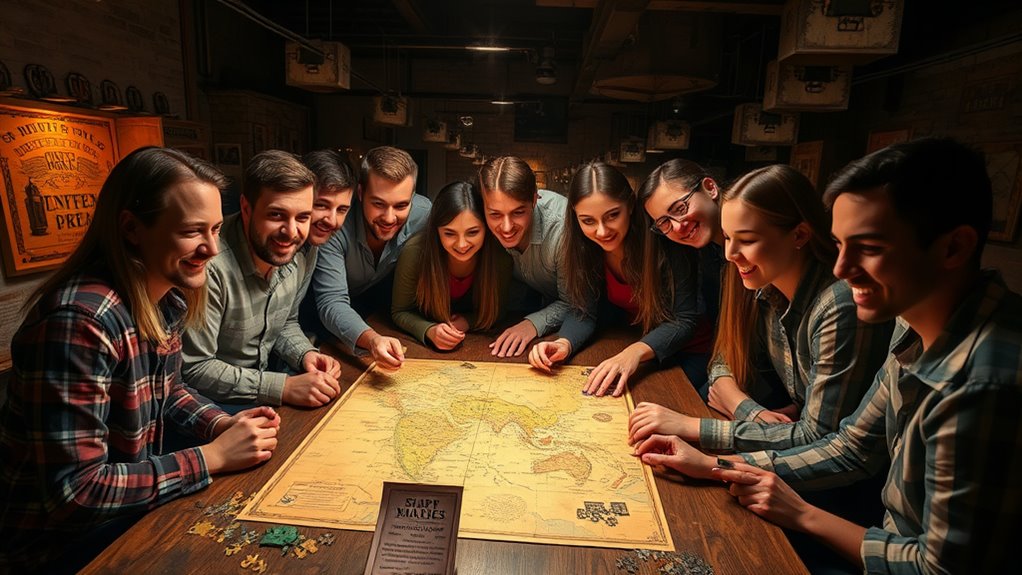Escape rooms are a fantastic way to boost your team’s communication, collaboration, and trust. As you work together to solve puzzles, you’ll develop creative problem-solving skills and sharpen your strategic thinking. The experience encourages leadership, adaptability, and quick decision-making under pressure. Plus, it’s a fun way to strengthen bonds, promote engagement, and build a positive organizational culture. Keep exploring to discover how escape rooms can transform your team dynamics even more.
Key Takeaways
- Enhances communication, collaboration, and trust among team members through shared problem-solving experiences.
- Fosters creative thinking, strategic planning, and leadership skills under pressure.
- Boosts morale, engagement, and organizational culture with fun and memorable activities.
- Develops adaptability, resilience, and quick decision-making in dynamic situations.
- Strengthens team cohesion and mutual reliance, improving overall teamwork and soft skills.
Enhances Communication Skills
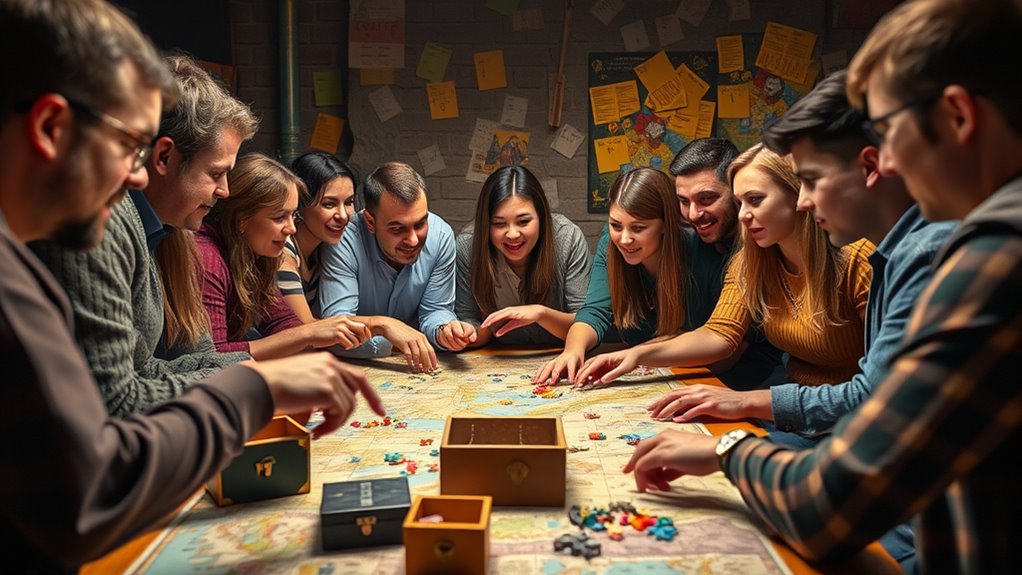
Participating in escape rooms naturally boosts your communication skills because you must share ideas clearly and listen carefully to others. As you work through puzzles, verbal clarity becomes essential to explain your thoughts precisely, ensuring your team understands your suggestions. You’ll quickly realize that effective listening skills are just as important — catching subtle hints and understanding teammates’ perspectives help prevent misunderstandings. This environment encourages you to articulate your ideas confidently and listen actively, fostering better dialogue. The need to communicate efficiently under pressure sharpens your ability to express yourself clearly and grasp others’ inputs. Additionally, engaging in such collaborative problem-solving activities can improve your teamwork skills, which are vital for successful communication in many settings. Over time, these skills transfer to everyday conversations and professional settings, making collaboration smoother and more effective.
Fosters Collaboration and Teamwork
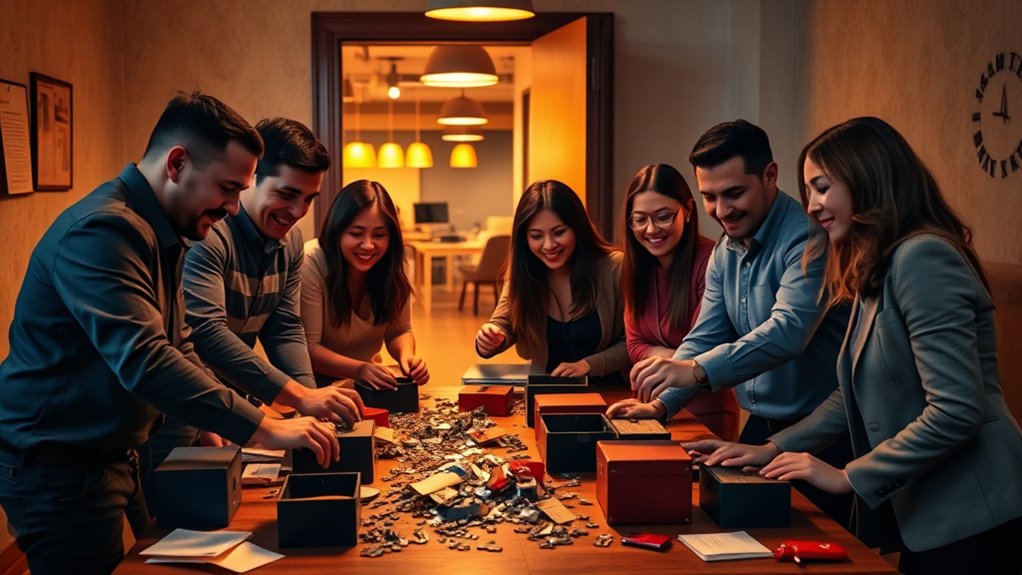
Escape rooms inherently promote collaboration and teamwork because they require participants to work together toward a common goal. As you work through puzzles and challenges, you naturally build trust with your teammates, knowing they’ll support and rely on each other. This environment encourages goal alignment, as everyone focuses on solving the escape within a set time. You learn to communicate effectively, share ideas, and listen to different perspectives, which strengthens your team’s cohesion. By steering through obstacles collectively, you develop a deeper understanding of each other’s strengths and weaknesses. These shared experiences foster a sense of unity, making your team more effective in real-world situations where cooperation and trust are essential for success. Additionally, the emphasis on problem-solving skills helps team members recognize and leverage each other’s strengths, further enhancing overall team performance.
Encourages Creative Problem Solving
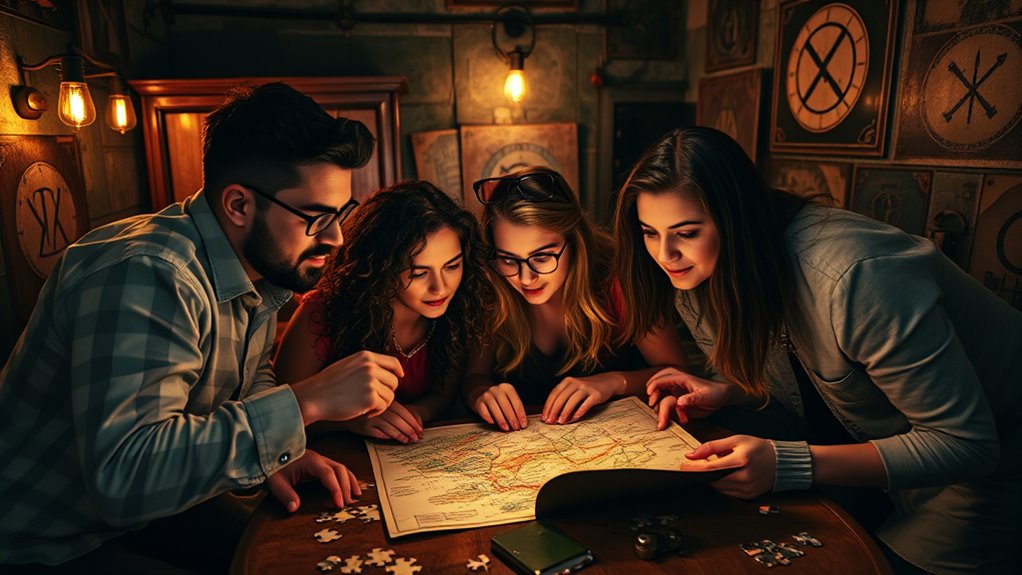
Escape rooms challenge you to think outside the box and find innovative solutions under pressure. As you collaborate, your ideas become clearer and more focused, boosting your problem-solving skills. Working together sparks creative brainstorming that leads to fresh, effective approaches. Additionally, engaging with complex puzzles can improve your creative problem solving abilities, making you more adaptable in various situations.
Innovative Thinking Boosts Clarity
When faced with complex challenges, engaging in escape room activities can considerably enhance your team’s innovative thinking. This environment pushes you to think outside the box, sharpening your clarity enhancement skills. Here are four ways it achieves this:
- Promotes creative problem-solving by encouraging unconventional approaches.
- Fosters rapid decision-making, reducing hesitation and increasing clarity.
- Challenges assumptions, helping you identify new perspectives.
- Strengthens focus, enabling you to prioritize tasks effectively.
Collaborative Brainstorming Enhances Creativity
Collaborative brainstorming during escape room activities sparks creativity by bringing team members together to generate diverse ideas quickly. When you work as a group, you can use techniques like mind mapping to connect concepts and expand idea generation. This process encourages you to think outside the box and explore multiple solutions simultaneously. To illustrate, consider this table:
| Technique | Benefit |
|---|---|
| Mind Mapping | Visualizes connections, sparks new ideas |
| Rapid Idea Generation | Keeps energy high, prevents stagnation |
| Group Collaboration | Fosters diverse perspectives, enhances creativity |
Engaging in these methods during escape rooms helps you develop innovative solutions faster. By encouraging open exchange and collective problem solving, you enhance your team’s creative capacity and ability to tackle complex challenges effectively. Additionally, practicing mindful decluttering principles can help team members approach challenges with a clearer mindset, fostering more effective collaboration.
Builds Trust Among Team Members
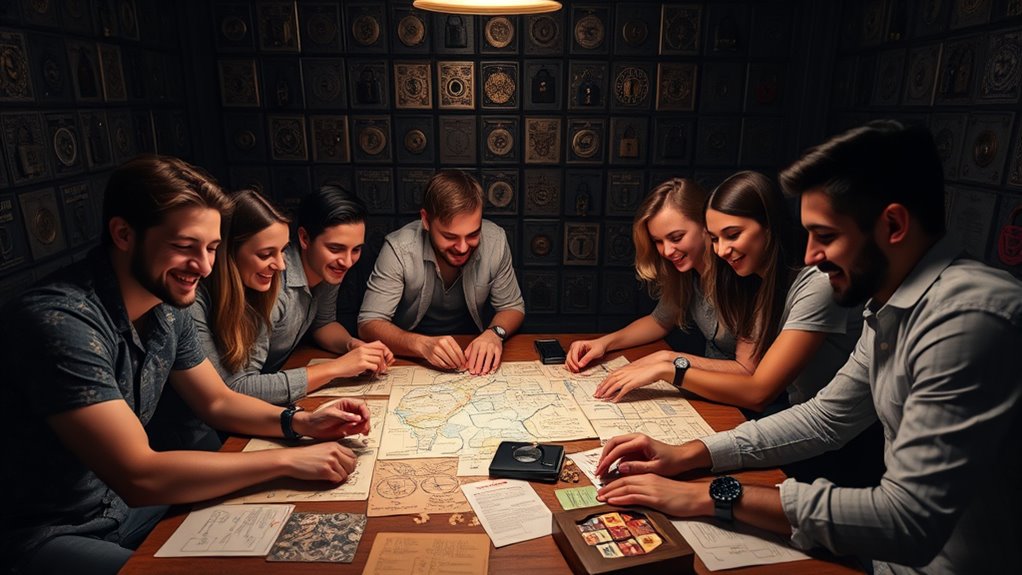
As you work together in an escape room, your communication skills improve as you share ideas and listen carefully. This collaboration fosters mutual confidence, making everyone feel more comfortable trusting each other’s abilities. Ultimately, these shared experiences help build a strong foundation of trust among team members. Additionally, engaging in problem-solving activities like escape rooms can enhance team dynamics, which are crucial for effective collaboration.
Enhances Communication Skills
Participating in escape rooms naturally fosters better communication among team members, as they must share information clearly and listen carefully to solve puzzles together. You’ll notice how non-verbal cues like gestures or facial expressions become essential for understanding teammates’ ideas. Active listening helps prevent misunderstandings and guarantees everyone’s input is valued. To strengthen these skills, focus on:
- Paying attention to non-verbal cues during discussions
- Clearly articulating your ideas without ambiguity
- Asking clarifying questions to confirm understanding
- Giving teammates your full attention, avoiding distractions
- Recognizing the importance of effective communication in building trust and collaboration.
These practices build a solid foundation for effective communication, making your team more cohesive. By practicing such skills in escape rooms, you develop habits that translate directly to everyday team interactions.
Encourages Collaboration Efforts
Because escape rooms require team members to work closely and rely on each other, they naturally foster trust. As you collaborate to solve puzzles, you’ll see how individual skills contribute to the group’s success, encouraging everyone to share their strengths. This shared effort promotes a sense of collective achievement, which strengthens bonds among team members. Through active participation, you’ll notice personal growth as you develop problem-solving, listening, and adaptability skills. Relying on each other’s expertise builds mutual respect and demonstrates how collaboration leads to better results. The process emphasizes that everyone’s contributions matter, reinforcing trust and creating a positive environment where team members feel confident in each other’s abilities. Additionally, engaging in such activities can improve overall team dynamics, leading to more effective cooperation in the workplace. This collective effort ultimately deepens trust and enhances overall teamwork.
Builds Mutual Confidence
Engaging in escape room challenges naturally strengthens mutual confidence among team members. As you work together to solve puzzles, trust building becomes essential for success. This environment fosters mutual understanding, encouraging everyone to rely on each other’s strengths. To deepen this trust, focus on:
- Communicating clearly and actively sharing information
- Recognizing each member’s contributions and skills
- Supporting teammates through challenges without judgment
- Celebrating collective achievements, reinforcing confidence in one another
- Incorporating team-based learning strategies to further enhance collaboration and trust among members
These practices promote open dialogue and a sense of reliability. Over time, this trust extends beyond the escape room, enhancing your team’s cohesion. Building mutual confidence is key to creating a resilient, collaborative work environment grounded in mutual understanding.
Improves Leadership Abilities

Escape rooms challenge team members to take charge under pressure, naturally fostering leadership skills. As you navigate puzzles and obstacles, you develop essential decision-making skills and leadership development. You learn to delegate tasks, motivate others, and adapt strategies quickly. Here’s how leadership qualities are strengthened:
| Skill | Example |
|---|---|
| Decision Making | Choosing the best clues to unlock the next step |
| Delegation | Assigning roles based on strengths to maximize efficiency |
| Communication | Clearly conveying ideas and listening to teammates |
| Problem Solving | Leading the team through complex challenges |
| Adaptability | Adjusting approaches when faced with unexpected setbacks |
In these moments, your ability to lead under pressure sharpens, preparing you for real-world leadership scenarios. Understanding team dynamics can further enhance your effectiveness as a leader in such high-pressure situations.
Boosts Morale and Engagement
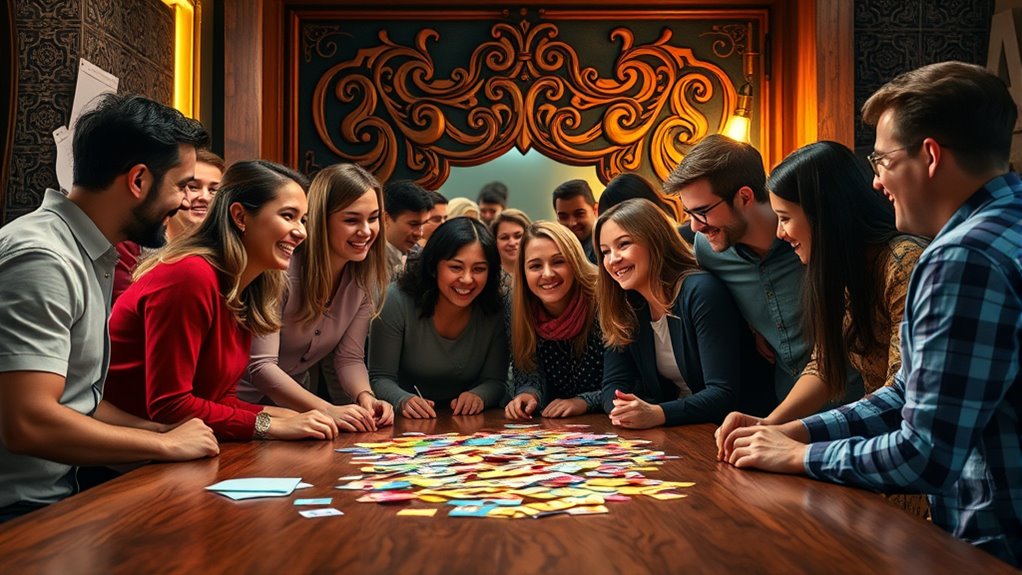
Participating in escape room challenges considerably boosts team morale and engagement by creating a fun, immersive environment where everyone feels valued. This experience provides a motivational boost, encouraging members to collaborate and share ideas openly. As you work together to solve puzzles, your team’s morale enhancement becomes evident through increased enthusiasm and mutual support. To maximize these benefits, consider these key factors: 1. Promotes a sense of achievement through shared success 2. Fosters open communication and trust among team members 3. Reinforces the importance of collective problem-solving 4. Cultivates enthusiasm, making team members more committed to common goals Design Thinking as a strategic approach can further enhance team collaboration and innovation in such activities.
Develops Adaptability and Flexibility
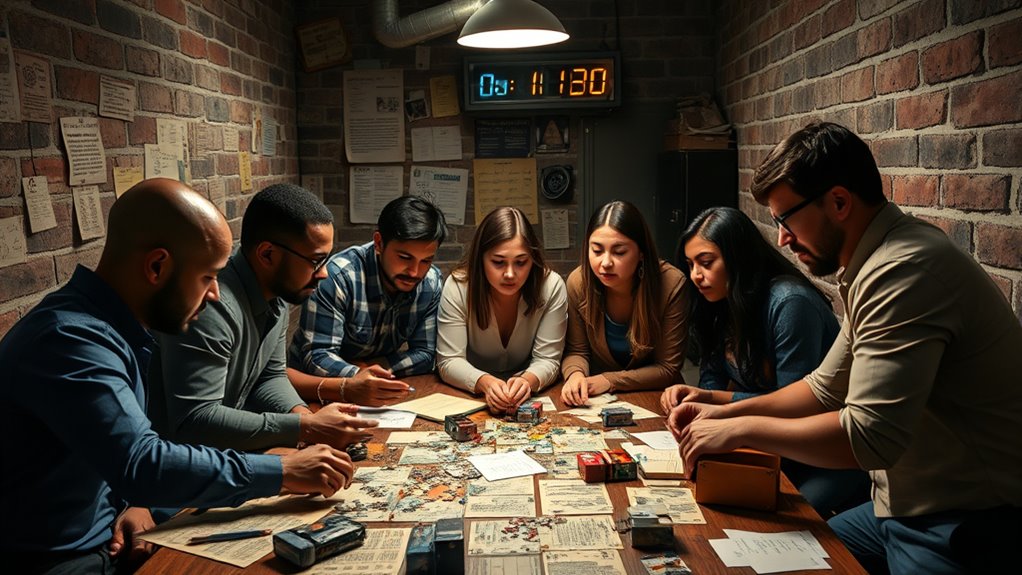
During escape room challenges, you’re pushed to think creatively and adapt quickly as new puzzles emerge. Making fast decisions becomes essential to keep the team moving forward under pressure. These experiences help you build resilience and stay flexible when faced with unexpected obstacles.
Encourages Creative Problem-Solving
Because they require quick thinking and innovative solutions, escape rooms naturally foster creative problem-solving. You’re challenged to think outside the box, using your creative thinking to overcome puzzles. This environment pushes you to develop new approaches and adapt your strategies on the spot. To enhance this skill, focus on these key aspects:
- Encouraging brainstorming to generate diverse ideas.
- Embracing unconventional methods for solving puzzles.
- Learning from trial and error without hesitation.
- Thinking flexibly when initial solutions don’t work.
Promotes Quick Decision-Making
Engaging in escape rooms sharpens your ability to make swift decisions under pressure. As you race against the clock, you learn to prioritize tasks quickly, improving your time management skills. You’re constantly evaluating risks—determining which clues to pursue or which options to discard—so you can act decisively. This environment pushes you to rely on instincts, balancing caution with urgency. Making quick decisions becomes second nature as you adapt to evolving puzzles and unexpected challenges. Your flexibility increases as you learn to modify strategies on the fly, without losing focus. Overall, escape rooms train you to stay calm and composed, honing your ability to act swiftly, manage your time effectively, and assess risks accurately—key skills for any fast-paced situation.
Fosters Resilience Under Pressure
Participating in escape rooms challenges you to adapt quickly when faced with unexpected obstacles. This environment is an excellent form of resilience training, helping you develop adaptability and flexibility under pressure. As you navigate tight time constraints and unforeseen puzzles, you learn valuable pressure management skills. To succeed, consider these key strategies:
- Stay calm and focused despite the chaos
- Communicate clearly with team members
- Think creatively to find alternative solutions
- Maintain a positive attitude to keep morale high
Reinforces Strategic Thinking
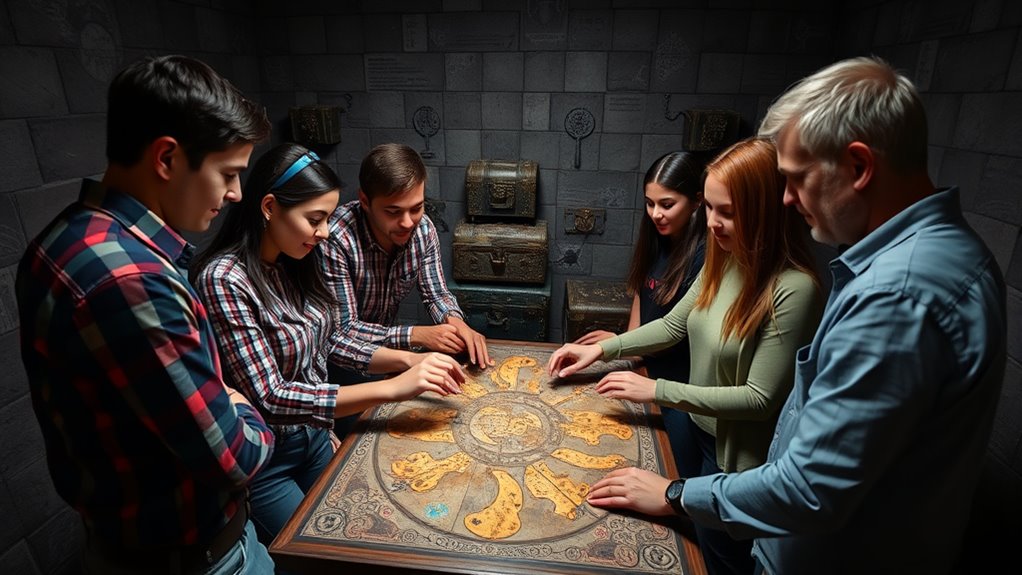
Escape rooms challenge your team to think critically and plan carefully, strengthening strategic thinking skills. As you work through puzzles and challenges, you develop your ability to formulate effective strategic planning, considering long-term goals and potential obstacles. This environment encourages you to evaluate options quickly and adapt your tactics as new information emerges. You learn to coordinate tactical execution efficiently, ensuring each team member’s strengths are utilized to solve problems faster. The need to prioritize tasks and allocate resources wisely sharpens your decision-making skills under pressure. Over time, these experiences enhance your capacity to approach real-world situations with a strategic mindset, making your team more capable of devising effective plans and executing them flawlessly.
Promotes Healthy Competition
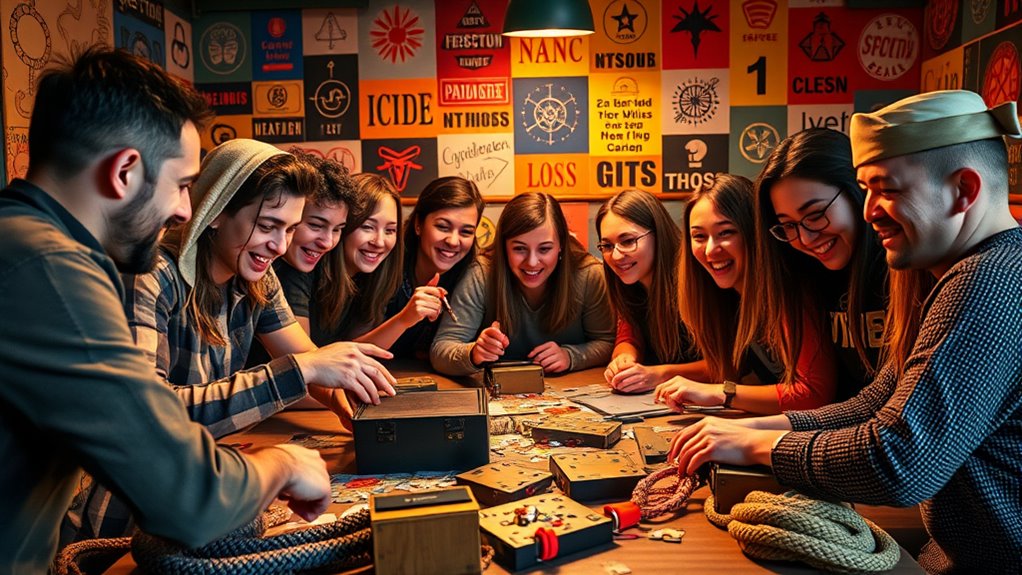
When teams compete in escape rooms, they experience a healthy sense of rivalry that motivates everyone to perform at their best. This strategic rivalry encourages you to push limits while maintaining good sportsmanship, emphasizing respect and fairness. Such competition fosters essential skills like resilience and adaptability, all within a supportive environment. To maximize these benefits, consider these key aspects:
- Embrace friendly competition to boost motivation.
- Focus on sportsmanship to promote respect among team members.
- Use rivalry to encourage strategic thinking and planning.
- Celebrate collective success, reinforcing team cohesion.
This balance of challenge and camaraderie helps develop a competitive spirit without negativity, making the experience constructive and empowering. Ultimately, healthy competition in escape rooms drives improvement while strengthening team dynamics.
Provides a Fun and Memorable Experience
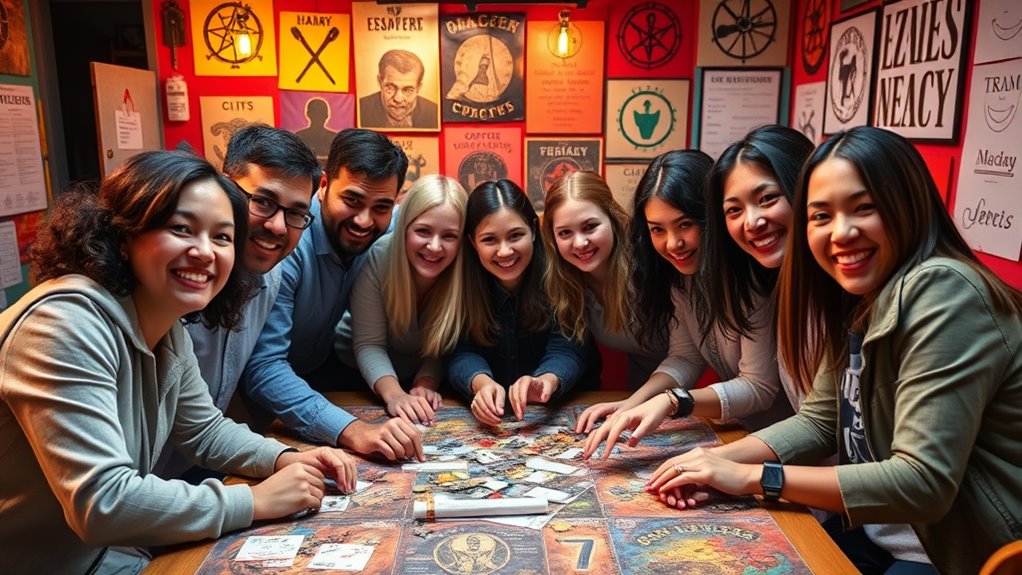
Building on the sense of healthy competition, escape rooms also deliver a fun and memorable experience that keeps everyone engaged. This shared adventure boosts team bonding as you work together to solve puzzles and escape. As you navigate challenges, you create lasting memories that strengthen your connection. To highlight this, consider the following benefits:
| Benefit | Description | Impact |
|---|---|---|
| Memory Creation | Unique, shared experiences stick with you | Long-term team cohesion |
| Fun Engagement | Keeps everyone motivated and involved | Increased morale and enthusiasm |
| Bonding Opportunities | Encourages collaboration in a relaxed setting | Builds trust and camaraderie |
Escape rooms transform work teams into a cohesive, engaged unit through fun, memorable experiences.
Frequently Asked Questions
How Do Escape Rooms Accommodate Different Team Sizes?
When considering how escape rooms accommodate different team sizes, you’ll find they offer excellent team size flexibility. They adapt to small or large groups by adjusting puzzles and challenges, ensuring everyone stays engaged. This flexibility supports adaptable group dynamics, allowing each member to contribute meaningfully. Whether you’re with a tight-knit team or a larger group, escape rooms are designed to foster collaboration and fun, making them an ideal team-building activity for various sizes.
Are Escape Rooms Suitable for All Fitness Levels?
They say, “Different strokes for different folks,” and escape rooms embrace that idea with fitness inclusivity. You’ll find adaptive challenges designed for all fitness levels, making the experience accessible and fun for everyone. Whether you’re a seasoned athlete or just starting out, escape rooms promote teamwork without overlooking individual needs. So, yes, they’re suitable for all fitness levels, encouraging participation and collaboration in a supportive environment.
What Safety Measures Are in Place During Escape Room Activities?
During escape room activities, safety protocols are carefully implemented to guarantee everyone’s well-being. You’ll receive a safety briefing before starting, covering emergency procedures and how to use any equipment properly. Trained staff are always on hand to assist if needed, and exit routes are clearly marked. These measures help prevent accidents and ensure a secure, enjoyable experience for all participants.
Can Virtual Escape Rooms Offer Similar Team-Building Benefits?
Like a digital bridge connecting distant shores, virtual escape rooms foster online collaboration and strengthen bonds through virtual interaction. You’re challenged to solve puzzles together, sharpening communication and problem-solving skills. While physically apart, you learn to trust teammates and share insights, mirroring real-world teamwork. These virtual adventures create a sense of unity, proving that even in the digital domain, team-building benefits flourish when minds connect and collaborate seamlessly.
How Often Should Teams Participate in Escape Rooms for Optimal Growth?
You should aim for a frequency optimization that balances engagement without burnout, typically once every few months. Regularly participating in escape rooms keeps your team engaged, sharpens problem-solving skills, and fosters collaboration. Too frequent sessions may diminish excitement, while infrequent ones could weaken team cohesion. By finding the right interval, you enhance team growth, maintain enthusiasm, and make certain each escape room experience contributes meaningfully to your team’s development.
Conclusion
So, next time you’re planning a team activity, consider an escape room. Imagine your team working together to solve puzzles, building trust and communication along the way. Like a recent case where a sales team boosted their collaboration and morale after just one session, you’ll see how these fun challenges translate into better teamwork back in the office. Escape rooms aren’t just games—they’re powerful tools to strengthen your team and create lasting memories.
